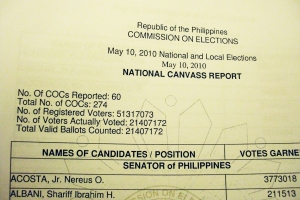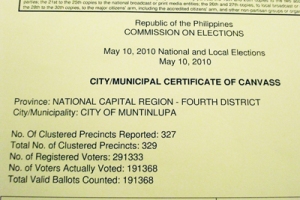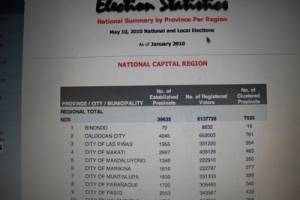Which of the two is the correct number? Actually, both are wrong.
Without even checking references, one would immediately know that both figures are incorrect because it is common knowledge that the Philippine population is just about 89 million. Since these figures are supposed to be system generated (meaning that they are automatically produced by the program of the Consolidation and Canvassing Server), these can be called defects of the product supplied by Smartmatic. Or in a more benign-sounding techie terminology, these are “glitches”.


Photo at left shows the Report No 1 of the National Canvass Report for Senator, certified by three Comelec Commissioners indicating the wrong number of registered voters in the Philippines. Photo at right is the close up of the document. The error in the CCS of the Presidential/Vice Presidential Canvass was the subject of discussion between Senate President Enrile and Smartmatic officer Cesar Flores during the first day of canvassing.
The “glitches” did not go unnoticed, though. In the senatorial canvass, representatives of the candidates, not having outgrown the habit of closely scrutinizing canvass documents during old, manual system where errors were aplenty, went over the system-generated report (which is supposed to be reliable because of less human intervention) and discovered the incorrect entry.
Comelec and Smartmatic officials apologized for the glitch, promising to correct it. Most of those in the canvassing teams of the candidates brushed it off, although when it was reported to me by my staff, I took a little bit more serious note of it. This was during the morning session of the canvassing.
When the Board of Canvassers (BOC) printed out the afternoon report, the first thing my staff did was to check if the error was corrected. It was not. It was then that I decided I had to go to the PICC to personally check on the documents and inquire about the process. At that time, I didn’t know it was a system generated report.
At the PICC, I was able to talk to Cesar Flores and I conveyed to him my support for an automated election. I then queried him about the reports that are being generated, particularly the reports per province as they are received by the BOC, because there are no reports being generated. The BOC simply reports out the consolidated tally, without us knowing the breakdown of results per province, unlike in the old system where you know the results that come in per province and you can cross check it with your field reports.
After our short chat, I was informed by my staff that the afternoon report was not corrected. It still contained the error in registered voters. I was also able to talk to a Comelec technical person who told me the Canvass Reports are system generated and that they will look into the error. After getting non-responsive answers to my questions, I left my staff to monitor the canvassing further.
When it was revealed through a report by Senate President Juan Ponce Enrile that a similar error was found in the CCS of the Presidential / Vice Presidential Canvass Board, red flags were raised in my head. Two separate systems, one error. But the curious thing is that while the nature of the errors were the same, the outcomes were different.
Of course, when both errors were discovered, the logical thing to do was to correct them. Not only was it logical, it was imperative. So the CCS in the Senatorial Canvass was corrected and the registered voters in the CCS of the Presidential /Vice Presidential Canvass was adjusted.
Most people settled down after those assuring actions were made. But wait, hold your horses!
In the canvass of the senatorial race, which has the same voting constituency as the President and Vice President, the figure that was indicated in the Total Registered Voters field after the correction was 51, 317, 073. Below is an image of the document, National Canvass Report No. 3 indicating the new number of registered voters which was used all the way through to Report No. 8.


But as revealed in the discussion during the first day of canvass for President and vice President, the figure that Smartmatic and Comelec used in correcting the erroneous entry in the number of registered voters is 51,292,465. I remember Senator Enrile asking what figure they used to change the wrong entry and if they were sure with the number as I was listening to the proceedings in the radio. True enough, those figures are the ones reported in the news.
With the two Consolidation and Canvassing Servers once again having differing numbers of registered voters, I decided to check which one was accurate. Where else will I turn to but the Commission on Elections? So I visited their website and clicked on the page where the registered voters were indicated.
Lo and behold, a figure different from both numbers appears in the website of the Comelec itself. In their tally, there are 50,723,733 registered voters in the Philippines as January 2010. To my knowledge, the last day of registration was October 31, 2009 per Comelec Resolution No. 8585, so this should be the correct figure. There couldn’t have been additional voters between January 2010 and February 9, 2010 when the campaign period started. Besides, this is the Comelec’s website, which should be updated with the latest data considering the importance of their work now.
Image of the Comelec website indicating a figure for registered voters different from both the CCS from the Senatorial Canvass and the CCS from the Presidential / Vice Presidential Canvass.

I wanted to give it the benefit of the doubt. After all, it might be that the COmelec website was not updated. So I did a double checking using a document I knew to be reliable (or it should be, unless it, too, is faulty). I referred to the Certificate of Canvass in my District, Muntinlupa City.
I checked the registered voters in Mutninlupa as indicated in the Certificate of Canvass for that city, certified by the City Board of Canvassers. It indicated that Muntinlupa City’s registered voters totaled to 291,333, as shown in the image below:

I cross-checked it with the figure in the Comelec website and they matched:

This shows that the data on the Comelec appears to be the correct data since the information pertaining to Muntinlupa City’s voting population is the same with the information contained in the Certificate of Canvass for the same city.
The question now is how come the information in the two Consolidation and Canvassing Servers are not only different from the information in the Comelec website but even different from each other?
It appears that three official sources have their own data with regard to the total number of voting population that the Philippines has. Smartmatic downplays the error in the Presidential and Vice Presidential Canvass as “innocent glitches”. But the fact that it happened also in the Senatorial canvass gives it a more than just an “innocent glitch” flavor. In addition, the error in the Presidential / Vice Presidential Canvass was discovered ahead of the one in the Senatorial Canvass which was even included in the first two reports signed by the Comelec Commissioners. That negligence caused the Comelec Commissioners to affix their seal of approval on something that was erroneous on something as basic as the total registered voters. In the case of the CCS for President and Vice President, the error was found out only after the Senate President did his official task of initializing the server.
Let me clarify though, that even if it does not take a genius to figure out how this error could be used for cheating, I am not saying that these observations are enough to suspect cheating. I am not looking at this as an indication of fraud but rather as an indication of sloppy work on the part of the supplier of the system.
But as the explanation was given that the program mistakenly added the voting population of each level of the reporting (from PCOS to Municipal Board to Provincial Board to National Board, etc.) the layman in me has enough common sense to question that it would take major programming “error” to mistakenly put into the program an instruction to add a mathematical formula (either addition or multiplication) in a field that is supposed to be static.
The so-called IT experts of Smartmatic and (those who worship them) want us to believe and take in hook line and sinker all that they say. I would want to, but I only believe something after it has passed scrutiny using my educated and ignorant questions. So far, some of their answers to questions have only bred more questions (like Mr. Flores’ explanation about the wrong date stamps on ERs being caused by clocks resetting while in transit. I countered that if a clock is reset, it is reset to a default “beginning of time” such as 01/01/1900 and not just resetting to a few days or few months back from the correct time. But that’s another story…)
Once more, with feeling…I am not complaining that I was cheated. I am not accusing anyone of cheating. But I do say that there’s enough to accuse someone of sloppy work. Sloppy work that the Filipino people are going to pay more than 7 Billion Pesos for.
Some people would probably ask, what should we do then? Well, I say we tell those who are responsible that they have sloppy work and tell them that right in their faces. Then we find ways to penalize them. Because if we take a lackadaisical attitude towards this negligence (or much worse, if we take their side and even defend their errors), it will surely come back and thumb its nose in our faces again in 2013.
